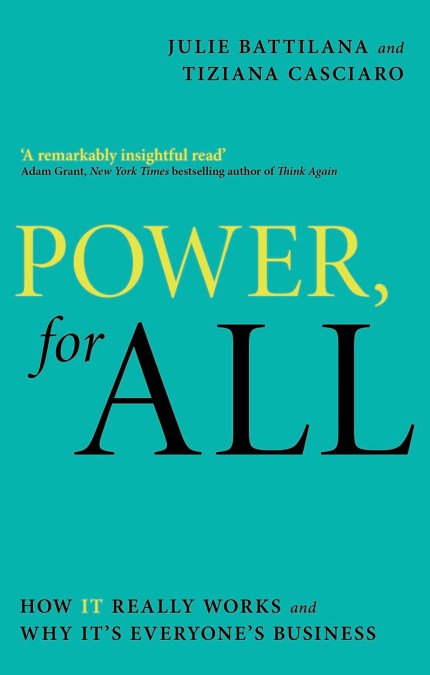‘A remarkably insightful read on what power is, how it’s gained and lost, and how it can be used for good. The masterful analysis by two leading experts will make you rethink some of your most basic assumptions about influence’ Adam Grant
Power isn’t just for the few at the top; it is potentially for everyone. You have power – and the power to use it.
Power is one of the most misunderstood – and therefore vilified – concepts in our society. Most people assume power is predetermined by personality or wealth, or that it’s gained by strong-arming others. Many write it off as inherently corrupt or ‘dirty’ and want nothing to do with it. But as pioneering researchers Julie Battilana and Tiziana Casciaro deftly show in Power, for All, power is the ability to influence someone else’s behaviour. This influence is derived from having access to valued resources, which anyone can have, regardless of their income or status in life. Everyone has a resource to offer, so everyone has access to power.
Battilana and Casciaro offer a timely, democratised vision of power. While hierarchies tend to stay in place because power is often sticky, by agitating, innovating and orchestrating change, they show how those with less power can challenge established structures to make them more balanced. They teach readers how to power-map their workplace to find who can create real change at work, plan for and cause sustaining power shifts, and understand the five motivations for seeking power – money and status, but also autonomy, achievement, affiliation and morality. They explore how these dynamics play out through vivid storytelling: as Donatella Versace successfully leads her brother’s company after his death – despite having a title, but little influence; what social movements can learn from youth climate activists and how they can go farther; and how a manager can gain the trust of sceptical employees and improve the workplace. Ultimately, Power, for All demystifies the essential mechanisms for acquiring and using power for all people.
Concentrated, accessible, and life-changing, Power, for All is the definitive guide to understanding and navigating power in our relationships, organisations and society.
Power isn’t just for the few at the top; it is potentially for everyone. You have power – and the power to use it.
Power is one of the most misunderstood – and therefore vilified – concepts in our society. Most people assume power is predetermined by personality or wealth, or that it’s gained by strong-arming others. Many write it off as inherently corrupt or ‘dirty’ and want nothing to do with it. But as pioneering researchers Julie Battilana and Tiziana Casciaro deftly show in Power, for All, power is the ability to influence someone else’s behaviour. This influence is derived from having access to valued resources, which anyone can have, regardless of their income or status in life. Everyone has a resource to offer, so everyone has access to power.
Battilana and Casciaro offer a timely, democratised vision of power. While hierarchies tend to stay in place because power is often sticky, by agitating, innovating and orchestrating change, they show how those with less power can challenge established structures to make them more balanced. They teach readers how to power-map their workplace to find who can create real change at work, plan for and cause sustaining power shifts, and understand the five motivations for seeking power – money and status, but also autonomy, achievement, affiliation and morality. They explore how these dynamics play out through vivid storytelling: as Donatella Versace successfully leads her brother’s company after his death – despite having a title, but little influence; what social movements can learn from youth climate activists and how they can go farther; and how a manager can gain the trust of sceptical employees and improve the workplace. Ultimately, Power, for All demystifies the essential mechanisms for acquiring and using power for all people.
Concentrated, accessible, and life-changing, Power, for All is the definitive guide to understanding and navigating power in our relationships, organisations and society.
Newsletter Signup
By clicking ‘Sign Up,’ I acknowledge that I have read and agree to Hachette Book Group’s Privacy Policy and Terms of Use
Reviews
In an age when authoritarians are on the rise and freedoms are imperiled, Julie Battilana and Tiziana Casciaro offer a fresh, more hopeful view of how power can be shared by all citizens. Their conclusions, rooted in research and world-wide reporting, show that power can be dirty but in honorable hands, can also be an enormous force for good. This book will be invaluable to anyone asking how to acquire power, how to keep it and how to exercise it for moral purposes
A remarkably insightful read on what power is, how it's gained and lost, and how it can be used for good. The masterful analysis by two leading experts will make you rethink some of your most basic assumptions about influence
Power, for All is an instant classic: a brilliantly conceived, beautifully written and highly informative guide to the critical but often misunderstood phenomenon of power. Battilana and Casciaro weave together insights from a wide range of research studies - brought to life through compelling stories - to present a profoundly moral case for how to use power to make our world better
Power dynamics are tricky, frustrating and frequently destructive. A central cause is the lack of a concrete, usable model for thinking through how to diagnose and shift power dynamics. In Power for All, Battilana and Casciaro fill this void by providing both a model and numerous case studies to illustrate how each one of us can manage power to more productive ends
In Power, for All, Battilana and Casciaro help us understand that power doesn't always have to destroy and take - it can be used to serve and build; and they show us how to organize in a way that combines our power with others. A necessary work for this cultural moment

